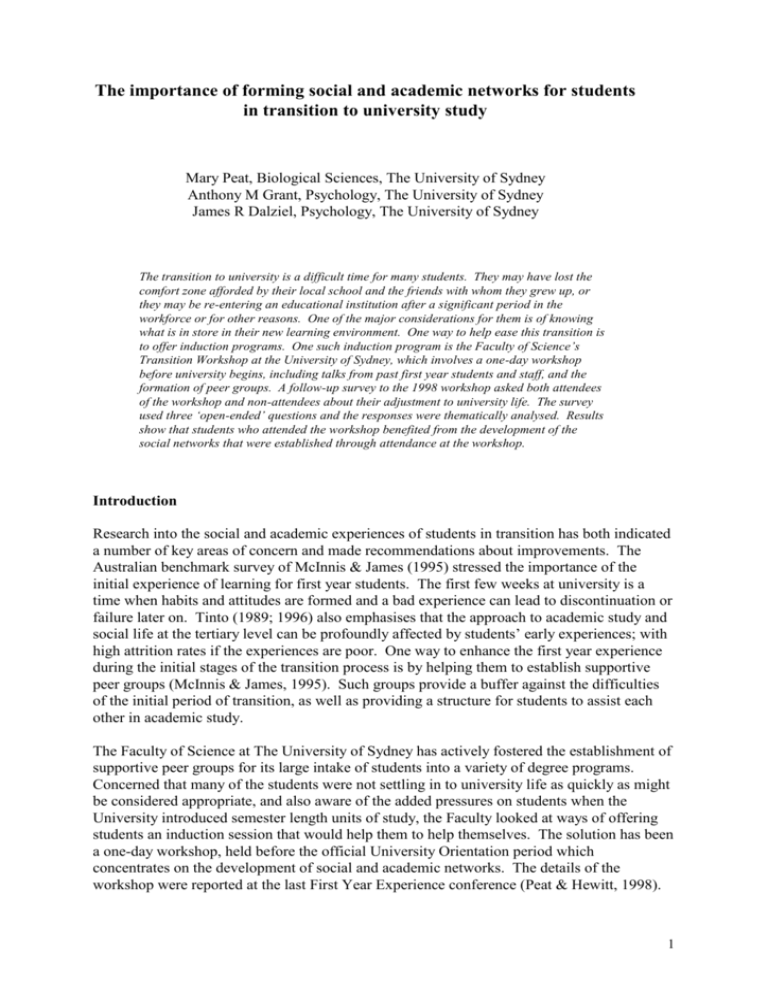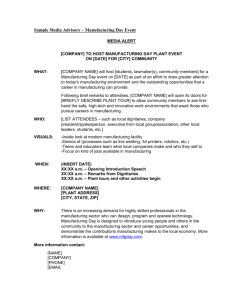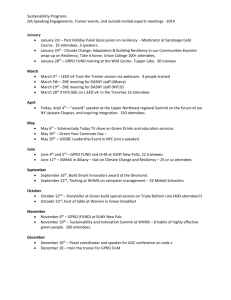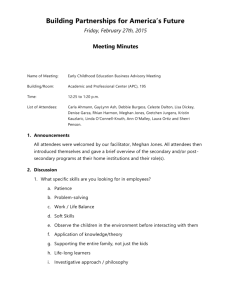"Jump-starting" the Transition: - First Year in Higher Education
advertisement

The importance of forming social and academic networks for students in transition to university study Mary Peat, Biological Sciences, The University of Sydney Anthony M Grant, Psychology, The University of Sydney James R Dalziel, Psychology, The University of Sydney The transition to university is a difficult time for many students. They may have lost the comfort zone afforded by their local school and the friends with whom they grew up, or they may be re-entering an educational institution after a significant period in the workforce or for other reasons. One of the major considerations for them is of knowing what is in store in their new learning environment. One way to help ease this transition is to offer induction programs. One such induction program is the Faculty of Science’s Transition Workshop at the University of Sydney, which involves a one-day workshop before university begins, including talks from past first year students and staff, and the formation of peer groups. A follow-up survey to the 1998 workshop asked both attendees of the workshop and non-attendees about their adjustment to university life. The survey used three ‘open-ended’ questions and the responses were thematically analysed. Results show that students who attended the workshop benefited from the development of the social networks that were established through attendance at the workshop. Introduction Research into the social and academic experiences of students in transition has both indicated a number of key areas of concern and made recommendations about improvements. The Australian benchmark survey of McInnis & James (1995) stressed the importance of the initial experience of learning for first year students. The first few weeks at university is a time when habits and attitudes are formed and a bad experience can lead to discontinuation or failure later on. Tinto (1989; 1996) also emphasises that the approach to academic study and social life at the tertiary level can be profoundly affected by students’ early experiences; with high attrition rates if the experiences are poor. One way to enhance the first year experience during the initial stages of the transition process is by helping them to establish supportive peer groups (McInnis & James, 1995). Such groups provide a buffer against the difficulties of the initial period of transition, as well as providing a structure for students to assist each other in academic study. The Faculty of Science at The University of Sydney has actively fostered the establishment of supportive peer groups for its large intake of students into a variety of degree programs. Concerned that many of the students were not settling in to university life as quickly as might be considered appropriate, and also aware of the added pressures on students when the University introduced semester length units of study, the Faculty looked at ways of offering students an induction session that would help them to help themselves. The solution has been a one-day workshop, held before the official University Orientation period which concentrates on the development of social and academic networks. The details of the workshop were reported at the last First Year Experience conference (Peat & Hewitt, 1998). 1 Briefly, the rationale for the workshop is to offer a collaborative session for students and teaching staff which centred on the knowledge that those students who work and socialise together are more likely to succeed, and are more likely to continue with their tertiary studies (Tinto, 1989, Tang, 1993). In the workshop, which has been held since 1996, the students are organised into groups that are focused around their primary area of interest, such as physical sciences, life sciences, mathematics and computer science, and psychology. The students’ timetables are manipulated so that within peer groups of 10-20 students, they are timetabled to meet in class for up to six hours a week for first semester. This might be a combination of laboratory classes (e.g. biology and chemistry, physics and chemistry), or laboratory class and tutorials (e.g. biology and psychology) or just tutorials (e.g. mathematics and computer science). The main activity of the workshop is to (re-)introduce students to the importance and benefits of peer networks and group study activities. A project investigating the relationship between transition experiences and student academic and social adjustments (Dalziel & Peat, 1998a) has already shown that students attending the workshop are less likely to have considered dropping out or deferring more likely to have been involved in collaborative learning activities more academically motivated more likely to have a well-developed sense of purpose and identity more appreciative of their courses more likely to adopt a deep approach to learning An analysis of academic performance shows that when adjustment is made for the effect of TER/UAI (NSW High School examination score) on WAM (weighted average mark at the end of Semester 1), there is still a significant and positive effect associated with attendance at the workshop, as well as with age (younger students obtained higher marks than older students) and gender (male students obtained higher marks than female students). These studies are ongoing and reported elsewhere (Dalziel and Peat, 1998b). This paper reports on a 1997 survey looking at the perceptions and attitudes of students in transition. All first year students, whether they attended the workshop or not, were sent a questionnaire by mail during the later part of Semester 1. For further details of the design of this survey, see Dalziel & Peat (1998a). Students were asked to respond to three open-ended questions: 1. How did attending the “Transition Workshop” help you in your adjustment to university life? (to be answered only by those who attended the workshop). 2. Please describe the three best aspects of your university experience during your first semester. 3. Please describe the three worst aspects of your university experience during your first semester. Results Seven hundred and forty seven questionnaires were sent to first year Faculty of Science students. Of the 289 students who responded (overall response rate of 39%), 215 did not attend the Transition Workshop (non-attendees’ response rate 38%). Of the 181 Faculty of Science students who attended the Transition Workshop, 74 returned questionnaires 2 (attendees’ response rate 41%). There was no significant difference between the frequency of attendees’ and non-attendees’ responses (2 df=1 = 0.514; p > .05 ns.). As the survey used a qualitative open-question methodology, the student responses are unsolicited as students determined the issues which they considered to be important. The response rates, therefore, should be seen as minimal, as a student may not have always indicated an outcome as a benefit (e.g. made friends). Workshop attendees’ responses to the question “how did attending the Transition Workshop help you in your adjustment to university life?” were thematically categorised. Of the 74 respondents the vast majority were positive (n [positive] = 69 vs. n [negative] = 5). Of the positive responses, there were three major themes, predominantly associated with the formation of social networks, which are detailed below. Forming Social Networks 53 respondents (71.6% of all attendees) reported forming social networks or peer groups as a result of the workshop. There were three broad categories, based on the level of friendship that developed. The least intimate of these categories centred on the theme “now recognise familiar faces”, a benefit reported by 16 of the total number of 74 attendees (21.6%). … I was able to spot a few familiar faces at lectures, etc., so I didn’t feel so lonely. The second level of intimacy revolved around the theme “made friends”; 24 of the 74 workshop participants (32%) reported the formation of friendships: It was brilliant because it (attendance at the workshop) really did create for me a new network of friends who I still see regularly. The most intimate theme that emerged, “made close friends”, was reported by 17 of the 74 attendees (23%). Respondents in this category were enthusiastic about the workshop: [The workshop was] Fantastic! As we were put into groups according to subject choice and timetable arrangement, we saw (and still see) these people all the time. It made a huge difference, especially in the first couple of weeks, in that we already had a circle of friends .... Having someone with the same timetable as me has been great as we get along really well - instant best friend! Social networks eased the transition The establishment of social networks was beneficial in terms of social and academic adjustment. Thirty-five of the attendees (47%) reported that the formation of social networks made the transition to university easier. Thirteen students (17.5%) mentioned that new friendships helped them in their studies: It was like a giant jump-start. Because I was settled with friends so quickly it was a lot easier to organise the work side of things ... with other people to help and talk to. It’s a fantastic idea. As first year students try to adapt to the demands of a new learning environment they often experience isolation, anxiety and depression (Farnill & Robertson, 1990). Twenty-two 3 participants (29%) reported that the social networks formed during the workshop helped with these problems: I met my friends (at the workshop) and we ALL thank you for this day. It has helped me adjust amazingly having friends [original emphasis]. Adapting to university life The reported benefits extended beyond the formation of social networks. The workshop was helpful in facilitating the transition to university in other areas. Thirteen respondents (17.5%) credited the workshop with helping them in their geographic orientation to university life: … I knew where some places were, so I didn’t feel lost on the first day. Nineteen participants (25%) found that the workshop gave them realistic expectations of university life and this eased the transition process: I think that because of the workshop my transition from high school to university has been a lot easier than other students. Negative perceptions of the workshop Of the 74 respondents, only 5 were not positive in their evaluation of the workshop. Three respondents commented that the workshop made “no difference”, “did not help at all” and “was not of much use”. Another wrote that the “social networks didn’t work”, and one was “not sure” if the workshop was of any help. Comparing attendees with non-attendees Participants’ self-reports may have been subject to demand characteristics, i.e. the tendency for respondents to conform to the researcher’s perceived expectations. To control for this possible bias, attendees’ and non-attendees’ responses to the two questions What were the three best aspects of your experience during your first semester? What were the three worst, aspects of your experience during your first semester? were compared. These questions did not mention the Transition Workshop. If workshop attendance really enhanced adapting to university then there should be significant differences between attendees’ and non-attendees’ responses to these two questions, and these differences should echo the thematic categories previously found. In answer to the first question, “please describe the three best aspects of your university experience during your first semester”, four categories emerged. Twenty-six of the 74 workshop attendees (35%) and 47 of the 215 non-attendees (22%) reported that issues related to an appreciation of student life at The University of Sydney were one of the three best aspects of their university experience. Gaining access to lots of facilities … resources rooms, photocopying and access to the Internet … and having beautiful buildings to learn in. 4 A chi-square analysis indicated that there was a statistically significant difference between the frequency of attendees’ and non-attendees’ responses (2 df=1 = 4.98; p < .05). Workshop attendees appeared to appreciate and enjoy student life at The University of Sydney more than non-attendees. Forty of the 74 workshop attendees (54%) and 84 of the 215 non-attendees (39%) reported that academic/study-related issues were one of the three best aspects of their university experience. A chi-square analysis indicated that there was a statistically significant difference between the frequency of attendees’ and non-attendees’ responses (2 df=1 = 5.62; p < .05). Compared to non-attendees, workshop attendees more frequently reported enjoying their studies. Forty-six of the 74 workshop attendees (62%) and 140 of the 215 non-attendees (65%) reported that social interaction issues were one of the three best aspects of their university experience. A chi-square analysis indicated that there was no statistically significant difference between the frequency of attendees’ and non-attendees’ responses (2 df=1 = 0.204; p > .05; ns). Thirty-six of the 74 workshop attendees (48%) and 113 of the 215 non-attendees (52%) reported that issues related to increased autonomy were one of the three best aspects of their university experience. A chi-square analysis indicated that there was no statistically significant difference between the frequency of attendees’ and non-attendees’ responses (2 df=1 = 0.355; p > .05; ns). The results are summarised in Table 1. Best aspects Appreciation of Student Life Academic / Study – related Social Interaction Issues Autonomy Issues Attendees (n= 74) Non-attendees 2 (df = 1) (n = 215) 26 (35%) 47 (22%) 4.98 < .05 sig. 40 (54%) 84 (39%) 5.62 < .05 sig. 46 (62%) 36 (48%) 140 (65%) 113 (52%) 0.204 0.355 > .05 ns. > .05 ns. p Table 1: Workshop Attendees And Non-attendees Reported Best Aspects Of Their First Semester Experience In response to the second question “please describe the three worst aspects of your university experience during your first semester”, five categories emerged. Fourteen of the 74 workshop attendees (19%) and 101 of the 215 non-attendees (47%) reported that isolation and loneliness were one of the three worst aspects of their university experience. These comments included feeling alone in large group teaching venues and not knowing how to overcome this, needing to have more guidance and not getting it, and having to take responsibility for self-learning but not knowing how to balance the long hours and workload with social life and family life. A chi-square analysis indicated that there was a 5 statistically significant difference between the frequency of attendees’ and non-attendees’ responses (2 df=1 = 15.8; p < .01). Thirty-three of the 74 workshop attendees (44%) and 104 of the 215 non-attendees (48%) reported that the quality of teaching was one of the three worst aspects of their university experience. A chi-square analysis indicated that there was no statistically significant difference between the frequency of attendees’ and non-attendees’ responses (2 df=1 = 0.324; p > .05; ns). Forty-five of the 74 workshop attendees (61%) and 110 of the 215 non-attendees (52%) reported that problems with studying were one of the three worst aspects of their university experience. A chi-square analysis indicated that there was no statistically significant difference between the frequency of attendees’ and non-attendees’ responses (2 df=1 = 2.11; p > .05; ns). Twenty-six of the 74 workshop attendees (35%) and 56 of the 215 non-attendees (26%) reported that problems with time demands were one of the three worst aspects of their university experience. A chi-square analysis indicated that there was no statistically significant difference between the frequency of attendees’ and non-attendees’ responses (2 df=1 = 2.17; p > .05; ns). Sixteen of the 74 workshop attendees (21%) and 40 of the 215 non-attendees (18%) reported general adjustment problems. A chi-square analysis indicated that there was no statistically significant difference between the frequency of attendees’ and non-attendees’ responses (2 df=1 = 0.27; p > .05). These results are summarised in Table 2. Worst aspects Loneliness factors Poor Teaching Quality Problems With Studying Demands On Time General Adjustment Issues Attendees n= 74 Non-attendees n = 215 2 (df = 1) 14 (19%) 101 (47%) 15.80 < .01 sig. 33 (44%) 104 (48%) 0.324 > .05 ns. 45 (61%) 110 (52%) 2.11 > .05 ns. 26 (35%) 56 (26%) 2.17 > .05 ns. 16 (21%) 40 (18%) 0.27 > .05 ns. p Table 2: Workshop Attendees And Non-attendees Reported Worst Aspects Of Their First Semester Experience Evidence for the Reliability of Responses 6 Comparing attendees’ and non-attendees’ responses to the best and worst aspects of university life provides evidence of the reliability of this qualitative assessment. The emerging thematic categories were identical for both attendees and non-attendees even though they were independently reported and analysed. This is evidence for homogeneity across both groups of students. The only significant differences between attendees’ and nonattendees’ responses are for issues that can logically be related to the effect of the workshop. This suggests that the workshop had a systematic effect on the participants and validates the attendees’ reports of the benefits of workshop attendance. Of the nine thematic categories that emerged from the analysis, there were no significant differences between attendees and non-attendees for the six categories of poor teaching, problems with studying, demands on time and general adjustment issues or for social interaction and autonomy (see Tables 1 & 2). As these six categories can be understood as being aspects of university life which are unlikely to be altered by attendance at the workshop, this result is important in validating the methodology. For example, a lecturer’s inability to deliver an interesting and engaging lecture will remain poor teaching regardless of students’ attendance at the workshop. Both attendees and non-attendees were subject to the same increases in autonomy, and had identical access to organised social and sport clubs. These shared experiences are reflected in the similar magnitude of attendees’ and nonattendees’ responses. There were, however, significant differences in responses between attendees and nonattendees for appreciation of student life, and also interest in academic subjects. Increased enjoyment of these factors may well be due to the formation of social networks and study groups associated with workshop attendance. Discussion The establishment of peer groups and social networks is an important ingredient in helping students in transition. It is recognised that the establishment of social networks buffers against stress and depression (Cohen & Hoberman, 1983; Wilcox, 1981). The development of cooperative learning groups or supportive learning communities is known to help in the study process (Banerjee, 1997; Slavin, 1996) and enhance the psychological well-being in first year undergraduates (Ederer, 1993). The findings of the present study are in accord with this previous research as evidenced by the attendees reports of greater appreciation of student life and study-related issues, and fewer personal problems (such as loneliness, anxiety, stress and depression). Given that all science students had at least six hours of classes weekly with the same people, but only those who actually attended the workshop and participated in the formal peer group-building process reported enhanced transition experiences, then any arguments presenting the benefits of the workshop are strengthened. Ramsden (1992) notes that the quality of student learning is a function of the context of learning, and that students are best served by a learning environment in which they can meaningfully interact with other students. There are some limitations to the present study. Participants in the workshop were selfselected rather than randomly assigned. Random assignment to either the workshop or a control group would control for differences in individuals’ academic competence and their desire to succeed at university. For ethical reasons such control was not possible in the present study. Thus it is possible that the workshop attendees were significantly more 7 motivated to do well at university, or more academically competent than non-attendees. However, if the motivation to do well at university and personal academic competence were truly significant factors confounding the outcome of the workshop one would expect them to demand a higher level of teaching competency than non-attendees, and consequently report greater disappointment with poor teaching quality than non-attendees. One would also expect to observe fewer reported problems with studying. Neither of these was observed. Further, there were no significant differences between attendees and non-attendees in past school performance and extroversion (Dalziel & Peat, 1998a). Hence it would appear that the observed outcome was primarily due to the effects of the workshop rather than differences of personality, motivation and competence between the two groups. Future directions and conclusion It is clear that the workshop facilitated the formation of social networks and peer groups and these, in turn, eased the transition to university and enhanced the university experience. At present our understanding of the role of social networks and peer groups in the transition process is limited. Future research should seek to explore the details of this role, and should also seek to uncover individual differences that mediate the beneficial effects of peer group and social network membership. The Science Faculty workshop is a simple and effective intervention which enhances the transition to university by fostering social networks and peer groups. Despite their simplicity, such interventions are rarely used by university faculties. It may be that these kind of interventions are so simple and obvious that they have been overlooked. University faculties seeking to facilitate the transition processes should consider implementing similar Transition Workshops specifically designed to suit their own institutional profiles. References Banerjee, A. C. (1997). Effect of lecture and co-operative learning strategies on achievement in chemistry in undergraduate classes. International Journal of Science Education, 19(8), 903-910. Cohen, S. & Hoberman, H. M. (1983). Positive events and social supports as buffers of life change stress. Journal of Applied Social Psychology, 13, 99-125. Dalziel, J. & Peat, M. (1998a). Fostering collaborative learning during student transition to tertiary education: An evaluation of academic and social benefits. In C. Rust (Ed.), Improving student learning: Improving students as learners (pp. 272-283). Oxford: Oxford Centre For Staff and Learning Development, Oxford Brookes University. Dalziel, J. & Peat, M. (1998b). Academic performance during student transition to university studies. In Proceedings of the Third Pacific Rim Conference - First Year in Higher Education: Strategies for Success in Transition Years, Auckland, New Zealand. Ederer, E. (1993). Positive and negative social contacts and psychological well-being in juvenile girls. Studia Psychologica, 35(4-5), 397-402. Farnill, D., & Robertson, M. F. (1990). Sleep disturbance, tertiary-transition stress, and psychological symptoms among young first-year Australian college students. Australian Psychologist, 25(2), 178-188. McInnis, C., & James, R. (1995). First year on campus: Diversity in the initial experiences of Australian undergraduates. Melbourne, Australia: Centre for the Study on Higher Education. 8 Peat, M. & Hewitt, R. G. (1998). Improving the first year experience: to set a new culture in place, Faculty of Science style. In Proceedings of the Third Pacific Rim Conference First Year in Higher Education: Strategies for Success in Transition Years, Auckland, New Zealand. Ramsden, P. (1992). Learning to teach in higher education. London: Routledge. Slavin, R. E. (1996). Research on co-operative learning and achievement - what we know, what we need to know. Contemporary Educational Psychology, 21(1), 43-69. Tang, K. C. C. (1993). Spontaneous collaborative learning: A new dimension in student learning experiences Higher Education research and Development, 12(2), 115-130. Tinto, V. (1989). Leaving college: Rethinking the causes and cures of student attrition. University of Chicago Press: South Ellis. Tinto, V. (1996). Reconstructing the first year of college. Planning for Higher Education, 25(1), 1-6. Wilcox, B. L. (1981). Social support, life stress, and psychological adjustment: A test of the buffering hypothesis. American Journal of Community Psychology, 9(4), 371-386. 9







